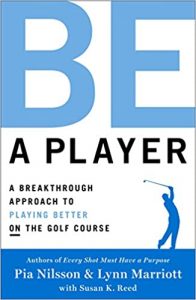

This is the second article I am writing about increasing your driving distance, the key to lowering your scores. If you can hit your drives 20 yards or so farther, you are going to reduce your handicap by about 30-40%, according to USGA distance studies.
My first instructional tip was about a swing flaw commonly seen in recreational women players, collapsing arms. Today’s tip isn’t technical. Instead it’s about what’s going on between your ears— a mental issue which one of the country’s leading instructors of top women players, Elena King, says women exhibit far more commonly than men.
Anxious to know what it is? Well, you’re on the right track. The issue is anxiety.

Her skills include being a recognized expert in the Vision 54 mental approach to the game. 
The human obstacle Elena says recreational women players exhibit much more commonly than their male counterparts is “embarrassment about how they play and fear of doing the wrong things,” she said.
“That leads to self-doubt,” she said, adding “Fear and doubt equals anxiety and eventually tension.”
Tension, no matter your gender, causes slower swing speeds. Slower swing speeds reduces driving distance, a lot.

So it is key to recognize and eliminate tension, just as Elena said.
“You have to have an awareness of being relaxed when you swing,” Elena said. “Indicators of tension might be how your shoulders feel, recognizing you are gripping the club tightly, that when you are about to or have completed a shot your toes are curled up in your shoes.”
But the most obvious and most likely indicator of stress and anxiety you can feel (and see in your friends as they play) will be the clenching of your jaw, Elena said. You might also lightly grind your teeth. Teeth grinding is common enough that it has a medical term, bruxism.
That’s where the potato chip comes in— put one between your teeth and practice not breaking it as your hit range balls and play. You may be surprised when you break the chip— as you start your backswing, or at the top of your swing, as you start down, perhaps at impact. In any case, you’ll learn where in your swing your tension resides.
There is no cookie-cutter way to eliminate your tension once you discover it, Elena cautioned. Some players players try to eliminate it by counting to themselves, others sing out loud or in their head to themselves as they play. Re-living happy memories is reported by many. PGA Tour player and Masters winner Fred Couples says he eliminates tension by remembering a shot he hit well that is like the shot he is about to execute. You might listen to music (where it’s allowed). Every player has different amounts of and deals with their tension differently. All have some and are affected by it, however, Elena said.
If you find yourself digging my blog, please feel free to forward it to a friend who might also enjoy it.
As always, I would love to hear from you — feel free to shoot me an email to blake@thewomangolfer.com with any questions, comments or suggestions for future posts.



